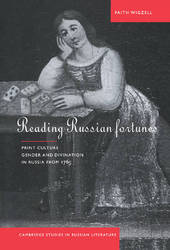
|
Reading Russian Fortunes: Print Culture, Gender and Divination in Russia from 1765
Hardback
Main Details
| Title |
Reading Russian Fortunes: Print Culture, Gender and Divination in Russia from 1765
|
| Authors and Contributors |
By (author) Faith Wigzell
|
| Series | Cambridge Studies in Russian Literature |
|---|
| Physical Properties |
| Format:Hardback | | Pages:266 | | Dimensions(mm): Height 229,Width 152 |
|
| Category/Genre | Fortune-telling and divination |
|---|
| ISBN/Barcode |
9780521581233
|
| Classifications | Dewey:133.30947 |
|---|
| Audience | | Professional & Vocational | |
|---|
| Illustrations |
7 Halftones, unspecified
|
|
Publishing Details |
| Publisher |
Cambridge University Press
|
| Imprint |
Cambridge University Press
|
| Publication Date |
28 May 1998 |
| Publication Country |
United Kingdom
|
Description
Reading Russian Fortunes examines the huge popularity and cultural impact of fortune-telling among urban and literate Russians from the eighteenth century to the present. Based partly on a study of the numerous editions of little fortune-telling books, especially those devoted to dream interpretation, it documents and analyses the social history of fortune-telling in terms of class and gender, at the same time considering the function of both amateur and professional fortune-telling in a literate modernising society. Chapters are devoted to professional fortune-tellers and their clients, and to the publishers of the books. An analysis of the relationship between urban fortune-telling and traditional oral culture, where divination played a very significant role, leads on to a discussion of the underlying reasons for the persistence of fortune-telling in modern Russian society.
Reviews'... this is a book of broad scholarship, albeit very readable and with a good deal of humour, which should be read not only by Russian specialists, but by anyone interested in the wider study of European culture. It is an original book on a largely unexplored topic, well researched and well written, which has much to offer social and cultural historians, literary historians, and perhaps even anthropologists.' Journal of European Studies
|